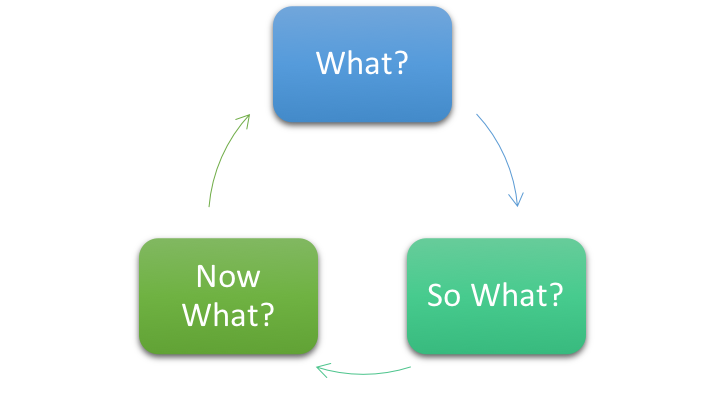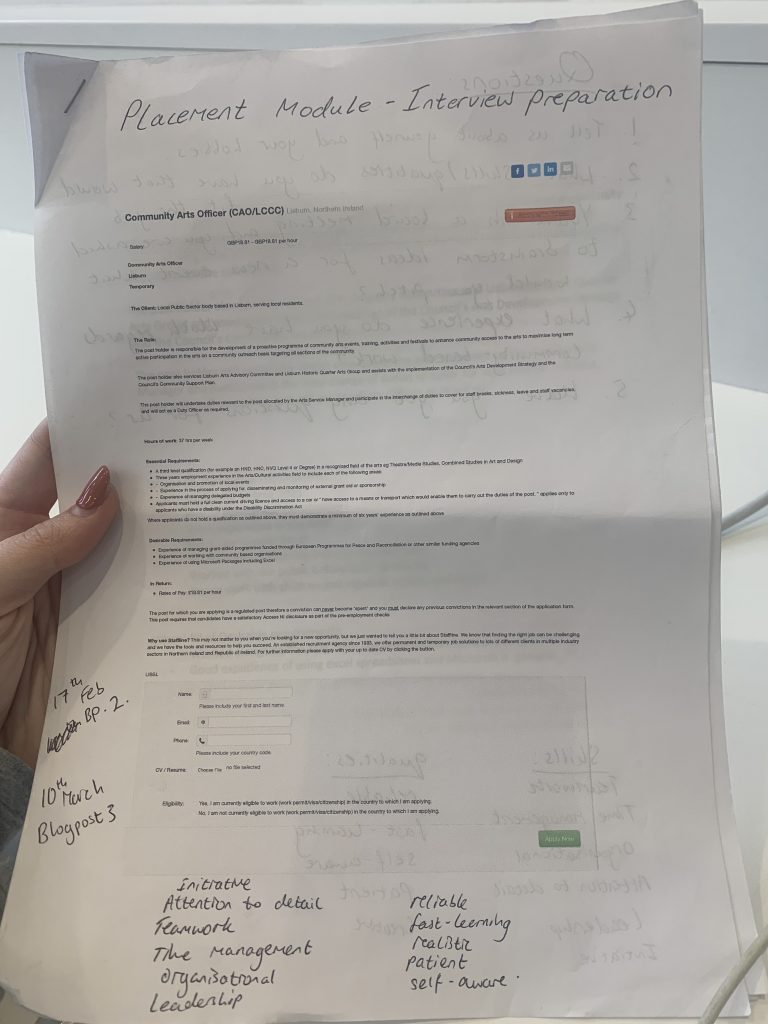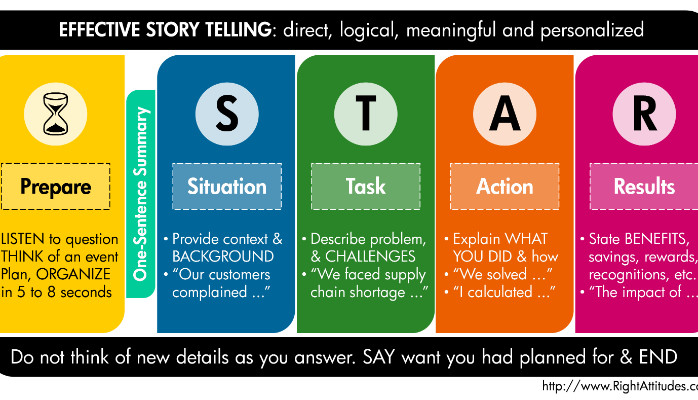You’re Hired… I hope!
Although studying theatre prepares you for the arts industry, this simulation taught me that gaining employment in this competitive environment is a challenging task!
The adrenaline… the intensity… the first impression can make or break any application!
Anxiously waiting for a friendly ‘hello’ from the panel can be the most daunting couple of seconds of any interview!
Borton’s reflective model is fitting to analyse what happened, what I learned and what I could do in the future. Borton’s model is non-constricting and allows me to think carefully through the different stages of the process, reflect on what I did and make plans for further interviews.

Wait, what happened?!
I interviewed for Lisburn Council’s ‘Community Arts Officer’ role, working with a variety of communities and making the arts accessible to everyone. After having prepared many documents relating my drama-based knowledge to this position, I entered the interview. Although filled with anxiety, I ensured to provide a warm, inviting presence, keeping my potential employer at ease.
I maintained eye contact as looking confidently at the employer “tells them that you are interested, attending to what is being said and have nothing to hide.” [1] I managed my time wisely in giving informative answers to all questions, yet avoided rambling on. Wanting to highlight my knowledge of the industry, I discussed problems such as budget, representation and inclusivity, impressing the employer.
Our job description included a list of essential/desirable qualities which I related to my own experiences; presenting myself not only as competent, but as a unique candidate. Therefore, in experiencing the employer role, I realised they want to know “the sort of person you are” [2].
In describing my transferable skills, Ellis reminded me that…
“You should come up with examples that, based on your knowledge of the organisation, will best reflect the skills and behaviours they are looking for .” [3]
When faced with the all-important, ‘Do you have any questions?’, I took advice of Emma Lennox in asking what qualities were expected of me personally in this role; indicating my enthusiasm to join their workplace. Out of sheer nervousness, I forgot to highlight my leadership skills and instead mentioned this later, as it was essential to my employer’s expectations. Unfortunately, in a question regarding covering for absent staff, I expressed how very frustrating this situation is, which slightly damaged the interview’s positive atmosphere. However daunting, it was a beneficial process overall.

So what did I learn?
Developing my fast-thinking skills, I learned what is expected of a candidate from both an interviewer and interviewee perspective, which surprisingly humanised the employer to me. An interviewer furiously writing notes can be off-putting, however I realised it is not a poor reflection of the candidate. If anything, it is positive to want to remember their ideas!
As I did not fill the years’ experience this posting required, I learned you can still sell yourself as an essential part of the operation, as…
“Your role is to persuade them that you are the answer to their problem, so it is important to: look enthusiastic, emphasise your strengths and achievements, play down your weaknesses and smile every now and then.” [4]
Having prepared for the interview by tirelessly bullet-pointing my relevant experiences, my placement experiences and the STAR Technique helped to structure my answer when faced with the daunting community-based experience question. I described the situation of my placement, the task of reaching out to silenced communities and my action to translate mental health campaigns into creative ideas. This resulted in the construction of a gallery project in the MAC Belfast. This technique allowed me to break my answer down into concise and easy-to-follow steps, preventing over-explaining or losing my focus- which could easily happen under pressure!

One question surrounding new ideas for the council taught me that in the arts industry; confidence and innovation are the key to employment! It is precisely these new ideas that will set you apart from your competition! Having realised this sooner, I would have planned an array of new campaign ideas for the interviewer to digest.
This experience enhanced my knowledge of new career-paths. I learned preparation is key to this process, however, it is important not to be rigid. Adapting your answers slightly to fit the desired questions not only allows the interviewer to feel listened to, but makes you a more adaptable candidate.
Now what will I do?
Now begs the question of how I will bring these newfound interpersonal skills to my next interview. Within the simulation, I could have spent more time detailing my ideas to the employer as this is likely what they are most interested to hear about. Although highlighting skills is valuable, the employer wants to be excited by something only you can bring to the table. Within our industry, creative directors are “often authentic leaders, true to their beliefs, (and) open to new ideas.” [5]
I felt tense at the beginning, even accidentally repeating my own name and was exhausted by the end of this process. Next time, beforehand, I will relax by having a cup of tea or watch a video on relaxing the body, creating a peaceful headspace.
In the future I will highlight the organisation’s previous work. Now seeming rather obvious, I should have mentioned Lisburn Arts Council’s previous programmes and initiatives, or discussed their motto;
“We believe in placing art at the heart because art makes a difference.” [6]
Having accidentally mentioned a negative experience, I will ensure in the future that my answers radiate only positivity. Giving the employer reason to think I am anything other than an uplifting presence in their workplace would jeopardise any potential employment. It is incredible how the mind can blank at such a simple question of ‘Tell me about yourself,’. Therefore, creating a semi-rehearsed answer can eliminate any uncertainty I have.
Conclusively, in interviewing for a simulated position, I realised my uniqueness is my most powerful quality as a candidate!
References:
[1] Rebecca Corfield. Successful Interview Skills : How to Present Yourself with Confidence. Kogan Page, 1992. EBSCOhost,search.ebscohost.com/login.aspx?direct=true&db=cat02616a&AN=qub.b14156453&site=eds-live&scope=site. p.36.
[2] Kathleen Lines. 30 Minutes – before Your Job Interview. Kogan Page, 1997. EBSCOhost, search.ebscohost.com/login.aspx?direct=true&db=cat02616a&AN=qub.b15095125&site=eds-live&scope=site. p.27.
[3] R. T. Ellis. Interview Skills … from Both Sides of the Fence, 2015. EBSCOhost, search.ebscohost.com/login.aspx?direct=true&db=cat02616a&AN=qub.b19216609&site=eds-live&scope=site. p.22.
[4] Kathleen Lines. 30 Minutes – before Your Job Interview. Kogan Page, 1997. EBSCOhost, search.ebscohost.com/login.aspx?direct=true&db=cat02616a&AN=qub.b15095125&site=eds-live&scope=site. p.25.
[5] Anthony Rhine. Theatre Management : Arts Leadership for the 21st Century. Palgrave Macmillan, 2018. EBSCOhost, search.ebscohost.com/login.aspx?direct=true&db=cat02616a&AN=qub.b20975284&site=eds-live&scope=site. p.192.
[6] ‘About Us’, Arts Council of Northern Ireland, 2022. URL: http://www.artscouncil-ni.org.
Bibliography
‘About Us’, Arts Council of Northern Ireland, 2022. URL: http://www.artscouncil-ni.org.
Corfield, Rebecca. Successful Interview Skills : How to Present Yourself with Confidence. Kogan Page, 1992. EBSCOhost,search.ebscohost.com/login.aspx?direct=true&db=cat02616a&AN=qub.b14156453&site=eds-live&scope=site.
‘Declutter the Mind’,‘10 Minute Guided Meditation for Focus’, YouTube, 16 February 2019. URL: https://www.youtube.com/watch?v=ausxoXBrmWs.
Ellis, R. T. Interview Skills … from Both Sides of the Fence. [publisher not identified], 2015. EBSCOhost, search.ebscohost.com/login.aspx?direct=true&db=cat02616a&AN=qub.b19216609&site=eds-live&scope=site.p.22.
Lines, Kathleen. 30 Minutes – before Your Job Interview. Kogan Page, 1997. EBSCOhost, search.ebscohost.com/login.aspx?direct=true&db=cat02616a&AN=qub.b15095125&site=eds-live&scope=site.
Nagesh Belludi, ‘Use The STAR Technique to Ace Your Behavioral Interview’, Right Attitudes, 15 July 2008. https://www.rightattitudes.com/2008/07/15/star-technique-answer-interview-questions/.
Purdue University Northwest, ‘Borton Reflective Model’, Reflective Practice and Writing, 2022. https://www.pnw.edu/center-faculty-excellence/programs/teaching-portfolio-writing-support/reflective-practice-writing/.
Rhine, Anthony. Theatre Management : Arts Leadership for the 21st Century. Palgrave Macmillan, 2018. EBSCOhost, search.ebscohost.com/login.aspx?direct=true&db=cat02616a&AN=qub.b20975284&site=eds-live&scope=site.
You May Also Like

Interview a New You! – Becoming an Interview Guru
24 February 2023
To Be Or Not To Be – That Is The Interview Question
23 February 2023

